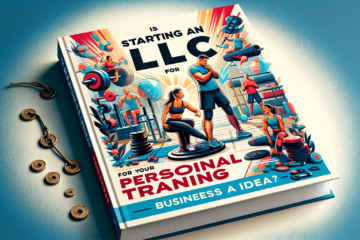Are you considering starting an LLC for your Amazon drop shipping business?
Find out if it’s a good idea in this informative article. We’ll analyze the advantages and disadvantages of setting up an LLC and how it can affect your business.
We’ll also explore alternative options to consider.
By the end, you’ll have a clear understanding of whether starting an LLC is worth it for your Amazon drop shipping venture.
Setting up an LLC for an Amazon drop shipping business provides limited liability protection, separating personal assets from business liabilities and shielding personal assets from legal actions or financial obligations. An LLC offers flexibility in management and taxation, with pass-through taxation allowing for lower overall tax liability, deductible business expenses reducing taxable income, and the opportunity to save on self-employment taxes. Establishing an LLC enhances credibility and professionalism, demonstrating commitment to operating legally and ethically, building trust with customers, suppliers, and partners, and enhancing reputation in the marketplace. However, there are some disadvantages to setting up an LLC, including additional costs associated with forming and maintaining it, potential limited life of the LLC, tax implications such as self-employment taxes, personal liability concerns in the event of legal issues or debts, and complex tax filing requirements compared to other business structures.
What Is an LLC
If you’re considering starting an LLC for your Amazon drop shipping business, it’s important to understand what an LLC is and how it can benefit you.
An LLC, or Limited Liability Company, is a legal entity that combines the advantages of both a corporation and a partnership. One of the main advantages of forming an LLC is the limited liability protection it offers. This means that as a business owner, your personal assets are protected from any liabilities or debts incurred by the LLC. This is particularly beneficial for drop shipping businesses, as they involve selling products that aren’t physically owned or stored by the business.
Another advantage of an LLC is the flexibility it provides in terms of management and taxation. Unlike corporations, LLCs can choose to be taxed as either a sole proprietorship, partnership, or even a corporation. This allows business owners to select the tax structure that best suits their specific needs and goals. Additionally, LLCs have fewer formalities and paperwork requirements compared to corporations, making them easier to set up and maintain.
On the other hand, there are also some disadvantages to consider when starting an LLC. One potential drawback is the additional costs associated with forming and maintaining an LLC. These costs include filing fees, annual fees, and potentially higher tax obligations. Additionally, an LLC may have limited life, meaning it could dissolve upon the death or withdrawal of a member, unless otherwise specified in the operating agreement.
Advantages of Setting up an LLC
Setting up an LLC for your Amazon drop shipping business offers several advantages.
Firstly, it provides liability protection, separating your personal assets from your business liabilities.
Secondly, an LLC allows for tax advantages, such as pass-through taxation where profits and losses are reported on your personal tax return.
Lastly, having an LLC lends credibility and professionalism to your business, making it more attractive to customers and potential partners.
Liability Protection for LLC
Protecting your assets is one of the key advantages of setting up an LLC for your Amazon drop shipping business. By forming an LLC, you create a separate legal entity that shields your personal assets from any liabilities or debts incurred by the business. This means that if your business faces legal actions or financial obligations, your personal assets such as your home, car, or savings won’t be at risk.
An LLC provides limited liability protection, which means that the owners, known as members, aren’t personally liable for the company’s debts or legal responsibilities. Your personal assets are separate from the business, offering you a level of protection and peace of mind.
In addition to asset protection, an LLC also offers other advantages such as flexibility in management, pass-through taxation, and easier access to business loans and funding. It’s important to consult with a legal professional to understand the specific laws and regulations regarding LLCs in your jurisdiction.
Tax Advantages of LLC
By starting an LLC for your Amazon drop shipping business, you can take advantage of tax benefits that come with this business structure. Here are three tax advantages of setting up an LLC:
-
Pass-through taxation: One of the biggest benefits of an LLC is that it offers pass-through taxation. This means that the business itself doesn’t pay taxes, but instead, the profits and losses are passed through to the owners and reported on their individual tax returns. This can result in a lower overall tax liability for the owners.
-
Self-employment tax savings: As the owner of an LLC, you have the opportunity to save on self-employment taxes. Unlike a sole proprietorship or partnership, where all income is subject to self-employment taxes, an LLC allows you to pay yourself a reasonable salary and only pay self-employment taxes on that amount.
-
Deductible business expenses: Another advantage of an LLC is that it allows you to deduct certain business expenses, reducing your taxable income. This can include expenses such as advertising, office supplies, travel, and more. Taking advantage of these deductions can help lower your overall tax bill and increase your financial advantages.
Credibility and Professionalism
When starting an LLC for your Amazon drop shipping business, you’ll consistently enhance your credibility and professionalism. Building trust is crucial in any business, and setting up an LLC demonstrates your commitment to operating legally and ethically.
By establishing a separate legal entity for your business, you show potential customers, suppliers, and partners that you’re serious about your venture. An LLC also provides you with legal protections, shielding your personal assets from business liabilities. This not only adds credibility but also instills confidence in your clients and partners.
Additionally, an LLC has clear legal obligations, such as maintaining proper records and adhering to tax requirements. Meeting these obligations demonstrates professionalism and reliability, further bolstering your reputation in the marketplace.
Disadvantages of Setting up an LLC
When considering the disadvantages of setting up an LLC for your Amazon drop shipping business, there are two main points to consider.
Firstly, there can be tax implications for an LLC, as the profits and losses of the business are passed through to the owner’s personal tax return.
Secondly, personal liability concerns may arise, as the owner’s personal assets may be at risk in the event of legal issues or debts incurred by the LLC.
It’s important to thoroughly evaluate these potential drawbacks before deciding to form an LLC for your Amazon drop shipping business.
Tax Implications for LLC
When setting up an LLC for your Amazon drop shipping business, it’s important to consider the tax implications and potential disadvantages that may arise. While an LLC offers many benefits, such as limited liability and flexibility in management, there are also some tax-related drawbacks to keep in mind:
-
Self-employment taxes: As the owner of an LLC, you may be subject to self-employment taxes, which can include both the employer and employee portions of Social Security and Medicare taxes. This can result in a higher tax burden compared to other business structures.
-
Double taxation: By default, an LLC is taxed as a pass-through entity, meaning that profits and losses pass through to the owners’ personal tax returns. However, if you elect for your LLC to be taxed as a corporation, you may be subject to double taxation, where the business is taxed on its profits and the owners are taxed on dividends.
-
Complex tax filing requirements: LLCs have additional tax filing requirements compared to sole proprietorships or partnerships. This includes filing an annual tax return, keeping thorough records of income and expenses, and potentially paying estimated taxes throughout the year.
It is crucial to consult with a tax professional to fully understand the tax implications of setting up an LLC for your Amazon drop shipping business and determine the best course of action for your specific situation.
Personal Liability Concerns
While considering the tax implications, it’s important for you to also be aware of the personal liability concerns that may arise when setting up an LLC for your Amazon drop shipping business.
One of the main advantages of forming an LLC is personal asset protection. This means that your personal assets, such as your house or car, are generally protected from business liabilities. However, it’s important to understand that personal liability protection isn’t absolute. If you engage in fraudulent or illegal activities, you may still be held personally liable.
Additionally, setting up an LLC also comes with legal compliance requirements that you need to fulfill. These requirements include maintaining accurate records, filing annual reports, and adhering to any specific regulations that apply to your industry.
It’s essential to stay informed and ensure that your business operates within the legal boundaries to avoid any personal liability concerns.
How an LLC Affects Your Amazon Drop Shipping Business
To understand how an LLC affects your Amazon drop shipping business, it’s important to consider the potential benefits and implications of this business structure. Here are three key ways in which an LLC can impact your business:
-
Limited personal liability: One of the main advantages of forming an LLC is that it offers personal liability protection. This means that your personal assets, such as your home or savings, are generally protected from being used to satisfy business debts or legal claims. By separating your personal and business finances, an LLC can help safeguard your personal wealth.
-
Enhanced profitability: Running your Amazon drop shipping business as an LLC can also have positive financial implications. By operating as a separate legal entity, an LLC allows for easier tracking and management of your business finances. This can help you make informed decisions, optimize your cash flow, and potentially increase profitability.
-
Legal requirements and compliance: When you form an LLC, you must comply with certain legal requirements, such as filing formation documents and paying registration fees. While these requirements may seem like a burden, they also come with benefits. By meeting these obligations, you establish your business as a legitimate entity, which can enhance your credibility and reputation among customers and suppliers.
Alternatives to Setting up an LLC
If an LLC isn’t the right fit for your Amazon drop shipping business, there are alternative options you can consider. Other legal business structures may offer more flexibility and better suit your needs. One such option is a sole proprietorship, where you’re the sole owner and operator of the business.
A sole proprietorship is the simplest and most common form of business ownership. It offers complete control and decision-making power, as you’re the sole owner. Additionally, there are no formal legal requirements or ongoing compliance obligations, making it easy and inexpensive to set up. This can be attractive to individuals who desire freedom and want to avoid the administrative burden associated with more complex business structures.
However, there are some downsides to consider. As a sole proprietor, you’re personally liable for any debts or legal issues that arise from your business. This means your personal assets could be at risk. Additionally, a sole proprietorship may not be as attractive to customers, suppliers, or investors, as it lacks the perceived credibility and professionalism of a formal business entity like an LLC.
Ultimately, the decision on which business structure to choose depends on your specific circumstances and goals. It may be worth consulting with a legal or financial advisor to help you make an informed decision.
Conclusion: Is Starting an LLC Worth It for Your Amazon Drop Shipping Business?
Is starting an LLC worth it for your Amazon drop shipping business? Here are the pros and cons to help you make an informed decision:
Pros:
-
Liability protection: One of the biggest advantages of forming an LLC is the limited liability it offers. By separating your personal assets from your business, you protect yourself from being personally liable for any debts or legal issues that may arise.
-
Credibility and professionalism: Having an LLC adds a level of credibility and professionalism to your Amazon drop shipping business. It shows potential customers and suppliers that you’re a serious and legitimate business entity.
-
Tax benefits: LLCs offer flexibility when it comes to taxes. You can choose to be taxed as a sole proprietor, partnership, or even as an S corporation. This flexibility allows you to optimize your tax strategy and potentially save money.
Cons:
-
Cost and paperwork: Setting up and maintaining an LLC can involve some costs and paperwork. You may need to pay filing fees, annual fees, and hire a registered agent. Additionally, you’ll need to comply with state regulations and file regular reports.
-
Complexity: LLCs have more administrative requirements compared to other business structures. You’ll need to document meetings, keep proper records, and follow specific operating agreements.
-
Limited protection: While an LLC offers liability protection, it isn’t foolproof. If you engage in fraudulent or illegal activities, you may still be held personally liable.
Ultimately, the decision to start an LLC for your Amazon drop shipping business depends on your specific circumstances and goals. Consider consulting with a legal and tax professional to determine the best course of action.
Frequently Asked Questions
How Much Does It Cost to Set up an LLC for an Amazon Drop Shipping Business?
Setting up an LLC for an Amazon drop shipping business can cost around $200 to $500. The cost breakdown includes fees for filing documents and obtaining necessary licenses. Advantages include limited liability, while disadvantages include additional paperwork and costs.
Do I Need a Physical Address to Register an LLC for My Amazon Drop Shipping Business?
Yes, you need a physical address to register an LLC for your Amazon drop shipping business. This is a requirement in the registration process to establish a legitimate business presence.
Can I Change the Name of My LLC After It Has Been Registered for My Amazon Drop Shipping Business?
Yes, you can change the name of your LLC after it’s registered for your Amazon drop shipping business. The benefits of an LLC for drop shipping include liability protection and flexibility in managing your business.
Are There Any Specific Legal Requirements or Regulations for an LLC Involved in Amazon Drop Shipping?
When starting an LLC for an Amazon drop shipping business, it’s important to understand the legal requirements and regulations involved. Familiarize yourself with the necessary steps and ensure compliance to operate smoothly.
Can I Have Multiple LLCs for Different Product Categories in My Amazon Drop Shipping Business?
Having multiple LLCs for different product categories in your Amazon drop shipping business can offer flexibility and organization. However, it also means managing separate legal entities and potential costs. Consider the pros and cons before deciding.
Conclusion
In conclusion, starting an LLC for your Amazon drop shipping business can be a worthwhile decision. It offers various advantages such as limited liability protection and flexibility in management.
However, there are also disadvantages to consider, such as additional paperwork and costs.
Ultimately, the decision to set up an LLC should be based on your specific business needs and goals.
It’s recommended to consult with legal and financial professionals to determine the best course of action.
This article is created with the aid of automated technology and then carefully reviewed and verified for accuracy by our professional editors.









